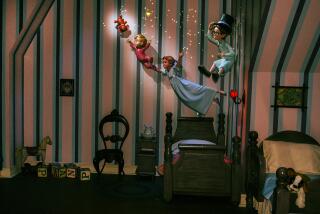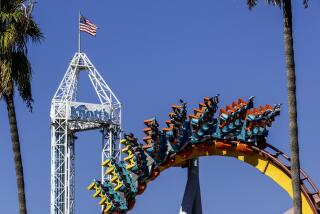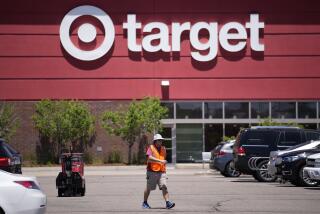Disneyland Bans Video Games Targeting People
- Share via
Responding to criticism aimed at violent video games after the school shootings in Littleton, Colo., Walt Disney Co. has pulled the plug on several coin-operated arcade games at Disneyland in which players shoot at human targets.
Workers unplugged or removed 30 games from the Tomorrowland and Critter Country arcades and at two Disney-owned hotels just west of the park late last month.
Disneyland executives would not provide a list of the titles removed, but they said the games were not in keeping with the Anaheim park’s family image.
“We just don’t think there’s any place for violent video games at Disneyland,” park spokesman Ray Gomez said. “This had probably been under consideration for a while, but the events in April brought it to the forefront of our thinking.”
The park’s new policy distinguishes between games in which the targets are living creatures and simple accuracy contests.
The Frontierland shooting gallery, where players shoot at light-sensitive targets including tombstones, lanterns and rocks, remains unaltered. The theme park also continues to sell toy guns.
Disney’s move comes amid a widespread outcry against violent video games since 13 people were shot to death at Colorado’s Columbine High School in mid-April. Shooters Eric Harris and Dylan Klebold were rabid fans of the carnage-soaked games “Quake” and “Doom.”
Their actions, along with several other school killings in recent years, have led to speculation that video games desensitize children to bloodshed, although psychological studies have not proved any link between virtual and actual violence.
On Wednesday, the Senate authorized a study to look into charges that the entertainment industry targets children in marketing violent products.
Game makers, many of which are attending the Electronic Entertainment Expo in Los Angeles this week, say they have become scapegoats for tragedies that are not so easily explained.
“There’s no research to show that violent video games lead to violence,” Douglas Lowenstein, president of Interactive Digital Software Assn., said at a breakfast kicking off the conference. “Video games don’t teach people to hate. They don’t teach people to be Nazis.”
Still, makers of coin-operated games are creating a rating system for arcade games similar to the one now used to grade software. Some arcade machines already bear stickers indicating the level of violence in their content.
Local theme parks and arcades have taken a variety of measures in response to concerns about video violence.
Six Flags Magic Mountain in Valencia is offering a monthlong promotion in which anyone who turns in a toy gun or violent video game at a nearby sheriff’s station gets a free park admission ticket.
At Dave & Buster’s, which has entertainment centers in Irvine, Orange and Ontario, the shoot-’em-ups “Terraburst,” “L.A. Machine Gun” and “Time Crisis 2” are among the most popular arcade games.
But no one under 21 is allowed into the centers without an adult. Employees are supposed to make sure adults are no more than an arm’s length away when their children are playing violent games, said Reggie Moultrie, the chain’s vice president of amusements.
“Our philosophy is: Mom, Dad, please monitor what your child is exposed to,” Moultrie said.
Knott’s Berry Farm executives say they took out arcade games in which players shoot at bad guys or monsters about five years ago. Players can still test their accuracy at Hunter’s Paradise in Ghost Town, but laser beams there pierce only tree stumps, frying pans and other inanimate objects, said Bob Ochsner, the Buena Park attraction’s manager of marketing and sales.
“It was just a matter of sensitivity,” he said.
*
Times staff writer Jennifer Oldham contributed to this report.






